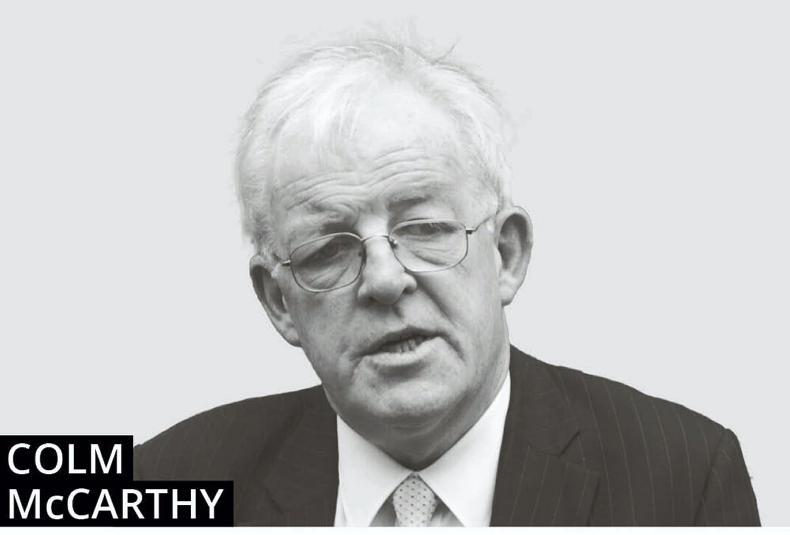The two great challenges for governments in the years immediately ahead will be dealing with COVID-19 and its consequences, and dealing with the climate threat. It is interesting to consider the international dimension in both cases.
It appears that the virus must be controlled in all major countries, or it will spread and re-infect even those who have achieved early success. Re-infection has been imported into China and other countries that have done well in virus suppression, like New Zealand. Whether it was realistically open to the Irish authorities to pursue a zero-COVID-19 target is moot at this stage, since the acting chief medical officer - Dr Ronan Glynn, has disavowed any such target. Should the virus remain prevalent in neighbouring countries, it would be difficult for a small trading economy to avoid bursts of re-infection, especially as the disease may be transmissible in non-human conveyors – frozen food is a suspect in New Zealand. It would have been nice if Dr Glynn had shared his pessimistic analysis of the zero-COVID-19 target with the rest of us, since there are reputable virologists in Irish universities who disagree. Moreover, there has been no serious effort to test incoming travellers at Irish sea and airports, for reasons that have not been explained. This has been done elsewhere in Europe, albeit in an uncoordinated fashion, despite which the summer holiday traffic surge has been blamed, among other factors, for the resurgence of the virus.
The European Union has failed to come up with a common approach on any public health aspect of the COVID-19 response and there is a huge range of policies in EU countries and across the world. This guarantees that there will be no uniformity of timescale in the suppression of the pandemic, even in Europe, hence the persistant high prevalence in some countries. The little microbes are unaware of the existence of 200 or so national governments around the world, but must be pleased at the plenitude of opportunity it bestows upon them.
The discovery of a vaccine should disappoint the little microbes whenever it is found, but they must be delighted with the discord already in evidence about vaccine distribution. Rich countries have been competing to pre-book large quantities of the more promising vaccine candidates, ignoring the insistence of the World Health Organisation that the pandemic is not fixed anywhere until it is fixed everywhere. Outbreaks of highly infectious and fatal diseases, which propagate rapidly across frontiers, are a principal reason why the organisation has ‘world’ in its title.
The United States has disengaged from the WHO, as it has from the Paris accord, in pursuit of Trump’s ambition to detach the US from the intrusions of international co-operation and multilateralism. If the United States could detach entirely and shoot itself into outer space as a distinct planet, there would be no more trade wars with China and the country would have its very own atmosphere to manage or mismanage. Climate change, which Trump once described as a hoax made up by China to damage the US, has also blamed the Chinese for releasing the actual virus and has announced that wind turbines cause cancer.
Since the planet has just one atmosphere, and every tonne of carbon emitted anywhere has the same deleterious effect on the climate, the imperative for co-ordinated international action is even clearer than in the case of COVID-19. Just three economic units, China, the US and the European Union, emit around 55% of the world’s total greenhouse gases between them and could lead the world’s governments in using the diminishing time available to take serious measures and distribute the costs. The Paris accord, to which Trump has taken exception, is a flawed document. The 30 years that have elapsed since the United Nations first sought urgent action from the world’s governments has largely been wasted and nothing was achieved, up to 2019, in actual emission reduction. These wasted years have a cost, since the accelerated action now needed will be more expensive.
The fight against COVID-19 and the fight against climate change are both hindered by the political triumph of the nation state as the unit of political organisation in recent decades. Political loyalties and accountability are essentially national, while critical problems of modern life require multilateral action. Drowned out in the chatter about the evils of globalisation, there has been a retreat from multilateralism, of which Trump and Brexit are the most prominent examples, which has the potential to inflict great harm. This retreat from international co-operation, a product of the political right in so many countries, does damage through trade wars, an ineffective COVID-19 response and climate paralysis.
Read more
The challenge of monetising sustainability
The two great challenges for governments in the years immediately ahead will be dealing with COVID-19 and its consequences, and dealing with the climate threat. It is interesting to consider the international dimension in both cases.
It appears that the virus must be controlled in all major countries, or it will spread and re-infect even those who have achieved early success. Re-infection has been imported into China and other countries that have done well in virus suppression, like New Zealand. Whether it was realistically open to the Irish authorities to pursue a zero-COVID-19 target is moot at this stage, since the acting chief medical officer - Dr Ronan Glynn, has disavowed any such target. Should the virus remain prevalent in neighbouring countries, it would be difficult for a small trading economy to avoid bursts of re-infection, especially as the disease may be transmissible in non-human conveyors – frozen food is a suspect in New Zealand. It would have been nice if Dr Glynn had shared his pessimistic analysis of the zero-COVID-19 target with the rest of us, since there are reputable virologists in Irish universities who disagree. Moreover, there has been no serious effort to test incoming travellers at Irish sea and airports, for reasons that have not been explained. This has been done elsewhere in Europe, albeit in an uncoordinated fashion, despite which the summer holiday traffic surge has been blamed, among other factors, for the resurgence of the virus.
The European Union has failed to come up with a common approach on any public health aspect of the COVID-19 response and there is a huge range of policies in EU countries and across the world. This guarantees that there will be no uniformity of timescale in the suppression of the pandemic, even in Europe, hence the persistant high prevalence in some countries. The little microbes are unaware of the existence of 200 or so national governments around the world, but must be pleased at the plenitude of opportunity it bestows upon them.
The discovery of a vaccine should disappoint the little microbes whenever it is found, but they must be delighted with the discord already in evidence about vaccine distribution. Rich countries have been competing to pre-book large quantities of the more promising vaccine candidates, ignoring the insistence of the World Health Organisation that the pandemic is not fixed anywhere until it is fixed everywhere. Outbreaks of highly infectious and fatal diseases, which propagate rapidly across frontiers, are a principal reason why the organisation has ‘world’ in its title.
The United States has disengaged from the WHO, as it has from the Paris accord, in pursuit of Trump’s ambition to detach the US from the intrusions of international co-operation and multilateralism. If the United States could detach entirely and shoot itself into outer space as a distinct planet, there would be no more trade wars with China and the country would have its very own atmosphere to manage or mismanage. Climate change, which Trump once described as a hoax made up by China to damage the US, has also blamed the Chinese for releasing the actual virus and has announced that wind turbines cause cancer.
Since the planet has just one atmosphere, and every tonne of carbon emitted anywhere has the same deleterious effect on the climate, the imperative for co-ordinated international action is even clearer than in the case of COVID-19. Just three economic units, China, the US and the European Union, emit around 55% of the world’s total greenhouse gases between them and could lead the world’s governments in using the diminishing time available to take serious measures and distribute the costs. The Paris accord, to which Trump has taken exception, is a flawed document. The 30 years that have elapsed since the United Nations first sought urgent action from the world’s governments has largely been wasted and nothing was achieved, up to 2019, in actual emission reduction. These wasted years have a cost, since the accelerated action now needed will be more expensive.
The fight against COVID-19 and the fight against climate change are both hindered by the political triumph of the nation state as the unit of political organisation in recent decades. Political loyalties and accountability are essentially national, while critical problems of modern life require multilateral action. Drowned out in the chatter about the evils of globalisation, there has been a retreat from multilateralism, of which Trump and Brexit are the most prominent examples, which has the potential to inflict great harm. This retreat from international co-operation, a product of the political right in so many countries, does damage through trade wars, an ineffective COVID-19 response and climate paralysis.
Read more
The challenge of monetising sustainability






 This is a subscriber-only article
This is a subscriber-only article









SHARING OPTIONS: